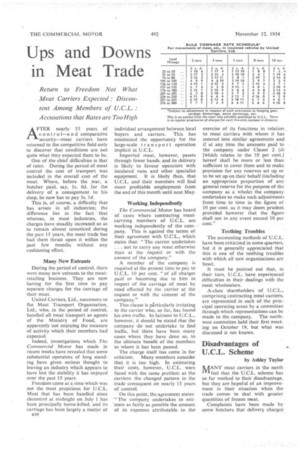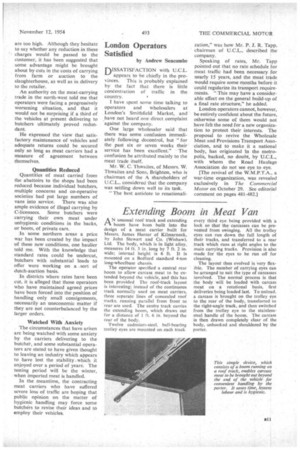Ups and Downs in Meat Trade
Page 44

Page 45

If you've noticed an error in this article please click here to report it so we can fix it.
Return to Freedom Not What Meat Carriers Expected : Discontent Among Members of U.C.L.: Accusations that Rates are Too High AF. TER nearly 15 years of contrel—and comparative security—meat carriers have returned to the competitive field only to discover that conditions are not quite what they expected them to be.
One of the chief difficulties is that of rates. During the period of meat control the cost of transport was included in the overall cost of the meat. Where, before the year, a butcher paid, say, Is. 6d. for the delivery of a consignment to his shop, he now has to pay 3s. id.
This is, of course, a difficulty that has arisen in all industries; the difference lies in the fact that whereas, in most industries, the charges have steadily increased so as to remain almost unnoticed during the past 15 years, the meat trade has had them thrust upon it within the past few months without any cushioning effect.
Many New Entrants
During the period of control, there were many new entrants ta the meatretailing business. They are now having for the first time to pay separate charges for the carriage of their meat.
United Carriers, Ltd„ successors to file Meat Transport Organisation, Ltd., who, in the period of control, handled all meat transport as agents of the Ministry of Food, are apparently not enjoying the measure of activity which their members had expeqed.
Indeed, investigations which The Commercial Motor has made in recent weeks have revealed that some substantial operators of long standing have given serious thOught to leaving an industry which appears tp have lost the stability it has enjoyed over the past 15 years.
Freedom came at a time which was not the most propitious for U.C.L. Meat that has been handled since decontrol at midnight on July 1 has been principally home-killed, and its carriage has been largely a matter of individual arrangement between local buyers and carriers. This has minimized the opportunity for the large-scale transport operation implicit in U.C.L.
Imported meat, however, •passes through fewer hands, and its delivery is likely to favour operators with insulated vans and other specialist equipment. It is likely then, that U.C.L. and their members will find more profitable employment from the end of this month until next May.
Working Independbntly
The Commercial. Motor has heard of cases where contracting meat.
carrying members of U.C.L. are working independently of the company. This is against the terms of their agreement with U.C.L., which states that: "The carrier undertakes . . not to carry any meat otherwise than at the request or with the consent of the company."
A member of the company is required at the present time to pay to U.C.L. 10 per cent. "of all charges paid or becoming due to him in respect of the carriage of meat by road effected by the carrier at the reqUest or with the consent of the company."
This clause is pisticularly irritating to the carrier who, so far, has found his own traffic. In fairness to U.C.L., however, it should be stated that the company do not undertake to find traffic, but there have been many cases where they have done so, to the ultimate benefit of the members to whom it has been passed.
The charge itself has come in for criticism. Many members consider that it is too high. In estimating their costs, however, U.C.L. were faced with the same problem as the carriers: the changed pattern in the trade consequent on nearly 15 years of control.
On this point, the agreement states: "The company undertakes to estimate as fairly as possible the amount of its expenses attributable to the exercise of its functions in relation to meat carriers with whom it has entered into similar agreements and if at any time the amounts paid to the company under Clause 2 (d) [which relates to the 10 per cent.] hereof shall be more or less than sufficient to cover them and to make provision for any reserves set up or to be set up on their behalf (including an appropriate proportion of any general reserve for the purpose of the company as a whole) the company undertakes to make such adjustments from time to time in the figure of 10 per cent, as it may deem prudent provided however that the figure shall not in any event exceed 10 per cent."
Teething Troubles
The accounting methods of U.C.L. have been criticized in some quarters, but it is generally appreciated that this is one of the teething troubles with which all new organizations are beset.
it must be pointed out that, in their turn, U.C.L. have experienced difficulties in their dealings with the meat wholesalers.
A-class shareholders of U.C.L., comprising contracting meat carriers, are represented in each ofthe principal operating 'areas by a committee through which representations can be made to the company. The northwest committee held their first meeting on October 19, but what was discussed is not known.
Disadvantages of U.C.L. Scheme
by Ashley Taylor lUTANY meat carriers in the north II ANY
that the scheme has so far worked to their disadvantage, but they are hopeful of an improvement in their situation when the trade comes to deal with greater quantities of frozen meat.
Complaints have been made by some butchers that delivery charges are too high. Although they hesitate to say whether any reduction in these charges would be passed to the customer, it has been suggested that some advantage might be brought about by cuts in the costs of carrying from farm or auction to the slaughterhouse, as well as in delivery to the retailer.
An authority on the meat-carrying trade in the north-west told me that operators were facing a progressively worsening situation, and that it would not be surprising if a third of the vehicles at present delivering to butchers • ultimately proved redundant.
He expressed the view that satis factory maintenance of vehicles and adequate returns could be secured only so long as Meat carriers had a measure of agreement between themselves.
Quantities Reduced
Quantities of meat carried from the abattoirs to the shops had been reduced because individual butchers, multiple concerns and co-operative societies had put large numbers of vans into service. There was also ample evidence of illegal carrying by C-licensees. Some butchers were carrying their own meat under unhygienic conditions in the backs, or boots, of private cars.
In some northern areas a price war has been created by the impact of these new conditions, one haulier told me. With the knowledge that standard rates could be undercut, butchers with substantial loads to offer were working on a ,sort of dutch-auction basis.
In districts where rates have been cut, it is alleged that those operators who have maintained agreed prices have been forced into the position of handling only small consignments, necessarily an uneconomic matter if they are not counterbalanced by the larger orders.
Watched With Anxiety
• The circumstances that have arisen are being watched with some anxiety by the carriers delivering to the butche'r, and some substantial operators are stated to have given thought to leaving an industry which appears to have lost the stability. which it enjoyed over a period of years. The testing period will be the winter, when imported meat is handled.
In the meantime, the contracting meat carriers who have suffered severe loss of traffic are hoping that public opinion on the matter of hygienic handling may force some butchers to revise their ideas and to employ their vehicles.




































































































